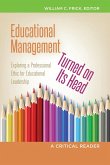There is a substantial body of important work that connects qualitative research and critical pedagogy at the level of teaching. Much of this literature is geared toward assisting teachers in becoming non-paternalistic agents of social change in their own classrooms. However, the connections between research and practice, from a critical pedagogical perspective, are far less frequently commented on at the level of policy. This book therefore seeks to provide educational leaders with a critical pedagogical approach to assess and reflect on their own work. The book is also designed to offer teachers and professors intellectual and practical tools for democratizing the leadership structures to which they are subjected.
«This is a powerful text that turns the concept of leadership on its head and puts it back on its feet again!» (Peter McLaren, Professor, Graduate School of Education and Information Studies, University of California, Los Angeles)
«In institutional and academic circles, the notion of educational leadership stands out as the most traditional. As Curry Stephenson Malott points out in clear revolutionary code, leadership in education is laced with undiluted power and a forthright intention to control the societal and cognitive rhythms of the academy by way of its white supremacist, hegemonic ideology tolerant of nothing less than the standardized knowledge industry emanating from the values of Anglo-centric capitalism. In this exciting book, Malott offers optional world views of educational leadership as a struggle for including actionist research qualitatively driven with critical theory and pedagogy coupled with an indigenous analysis of being in the world with little or no resemblance to the educational leadership as invented by white, European or North American civilization. The colonial models of educational leadership need not be any longer; and the reliance on the racialized socio-historical project of educational leadership can become truly transformative and begin to work in the interest of communities as they really are rather than on notions about who they should be. A must-read for all educational leaders.» (Hermán S. García, Regents Professor, New Mexico State University)
«This book is a long-overdue challenge to the very foundations of leadership ideology in Western nations. Curry Stephenson Malott boldly takes on the founding fathers of leadership, organization, systems, and behaviorist theories, and clears a new path for thinking about leadership in a democracy. By reuniting Western educational leadership with its historical roots in capitalism and colonialism, dissecting it via Marxist analysis, and contrasting it with often-untold histories of African and indigenous histories, he reveals Western leadership's intrinsically anti-democratic and oppressive nature. The text goes beyond critique as Malott provides historical and contemporary alternatives to hegemonic leadership models, as well as critical pedagogical frameworks for knowledge workers to rethink the face of leadership so that it may foster rather than quell democracy. As a true alternative to the hierarchical leadership models that have dominated Western education for centuries, this is a must-read for not just leaders or leaders-in-training but for all educators who envision education as the foundation for liberation and democracy.» (Tricia Kress, UMASS Boston)
«Curry Stephenson Malott's command of a personal, protagonist[ic,] and critical analysis of educational leadership is a timely and necessary contribution for creating transformative educational spaces. This collection inspires and challenges educators to think beyond the way things have been done, to how they could be when we direct our praxis to socially just alternatives.» (Nathalia E. Jaramillo, Purdue University)
«For those of us who, like John Dewey, believe that a fundamental purpose of education is to deconstruct rather than reinforce the social injustices of a hegemonic society, Curry Stephenson Malott's groundbreaking work provides us with a new way to understand and achieve a practice of criticality around educational leadership - a framework that is greatly needed within today's educational landscape.» (Kecia Hayes, Assistant Professor, Montclair State University)
«Curry Stephenson Malott, one of the most important voices in critical pedagogy over the last five years, has done it again! In 'Policy and Research in Education' he applies his not inconsiderable critical analytical talent to the
«In institutional and academic circles, the notion of educational leadership stands out as the most traditional. As Curry Stephenson Malott points out in clear revolutionary code, leadership in education is laced with undiluted power and a forthright intention to control the societal and cognitive rhythms of the academy by way of its white supremacist, hegemonic ideology tolerant of nothing less than the standardized knowledge industry emanating from the values of Anglo-centric capitalism. In this exciting book, Malott offers optional world views of educational leadership as a struggle for including actionist research qualitatively driven with critical theory and pedagogy coupled with an indigenous analysis of being in the world with little or no resemblance to the educational leadership as invented by white, European or North American civilization. The colonial models of educational leadership need not be any longer; and the reliance on the racialized socio-historical project of educational leadership can become truly transformative and begin to work in the interest of communities as they really are rather than on notions about who they should be. A must-read for all educational leaders.» (Hermán S. García, Regents Professor, New Mexico State University)
«This book is a long-overdue challenge to the very foundations of leadership ideology in Western nations. Curry Stephenson Malott boldly takes on the founding fathers of leadership, organization, systems, and behaviorist theories, and clears a new path for thinking about leadership in a democracy. By reuniting Western educational leadership with its historical roots in capitalism and colonialism, dissecting it via Marxist analysis, and contrasting it with often-untold histories of African and indigenous histories, he reveals Western leadership's intrinsically anti-democratic and oppressive nature. The text goes beyond critique as Malott provides historical and contemporary alternatives to hegemonic leadership models, as well as critical pedagogical frameworks for knowledge workers to rethink the face of leadership so that it may foster rather than quell democracy. As a true alternative to the hierarchical leadership models that have dominated Western education for centuries, this is a must-read for not just leaders or leaders-in-training but for all educators who envision education as the foundation for liberation and democracy.» (Tricia Kress, UMASS Boston)
«Curry Stephenson Malott's command of a personal, protagonist[ic,] and critical analysis of educational leadership is a timely and necessary contribution for creating transformative educational spaces. This collection inspires and challenges educators to think beyond the way things have been done, to how they could be when we direct our praxis to socially just alternatives.» (Nathalia E. Jaramillo, Purdue University)
«For those of us who, like John Dewey, believe that a fundamental purpose of education is to deconstruct rather than reinforce the social injustices of a hegemonic society, Curry Stephenson Malott's groundbreaking work provides us with a new way to understand and achieve a practice of criticality around educational leadership - a framework that is greatly needed within today's educational landscape.» (Kecia Hayes, Assistant Professor, Montclair State University)
«Curry Stephenson Malott, one of the most important voices in critical pedagogy over the last five years, has done it again! In 'Policy and Research in Education' he applies his not inconsiderable critical analytical talent to the








